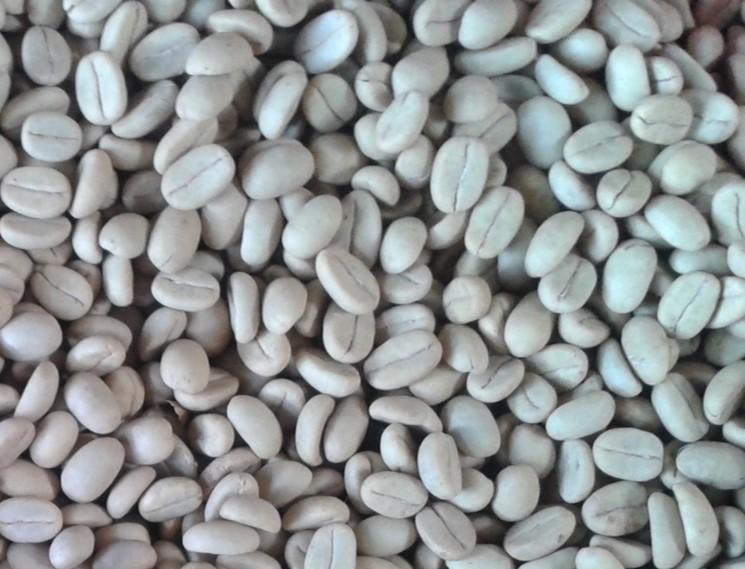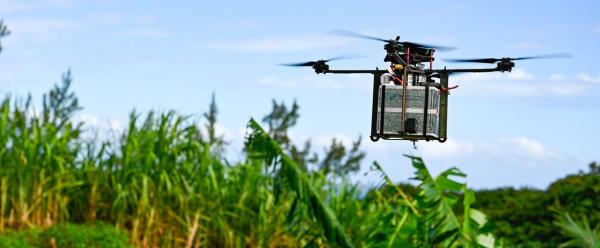Results & impact 10 October 2025
- Home
- Press area
- Press releases
- Starmaya coffee seeds Arabica
Arabica coffee: Starmaya, a hybrid variety available in seed form for the first time

Starmaya seeds © CIRAD
A team from CIRAD recently proved the possibility of producing Arabica F1 hybrid* seeds in seed gardens, by means of natural propagation by pollination. Their result, obtained for the Starmaya coffee variety, might seem insignificant, but is actually a world first. In what way?
Arabica is self-fertilizing, which hampers the creation of hybrid varieties in the field
Arabica plants have both male and female organs and the ability to self-fertilize. In the field, propagation by pollination produces 90% seeds from a single variety, ie a single parent (this is known as a line).
Cross-fertilization between two distinct individuals is still possible; Arabica F1 hybrids can thus be produced by crossing two varieties. However, producing F1 hybrid seeds means practising hand pollination, dusting pollen from one parent onto the flowers of the other. When millions of hybrid seeds are required, hand pollination is no longer viable, since each flower must be castrated by hand before being dusted with pollen from the other parent!
The key is a naturally male-sterile parent
To date, F1 hybrids were therefore produced by cloning in an in vitro culture laboratory (eg by somatic embryogenesis) or in nurseries, using horticultural propagation techniques. "Micropropagation methods are efficient but very costly, which has prevented many coffee producers from adopting this type of improved material", says Frédéric Georget, a biotechnologist with CIRAD, based in Costa Rica. "The technical obstacle has now been overcome in Nicaragua, thanks to a new variety, called Starmaya, created by CIRAD and Ecom Agroindustrial Corp".
Starmaya is the progeny of two parents, Marsellesa and CIR-SM01. The Marsellesa line (created by CIRAD) was chosen for its resistance to coffee leaf rust and its organoleptic qualities. Starmaya's novelty lies in the use of CIR-SM01: researchers discovered that it does not produce pollen, in other words it is male-sterile. Planting the two parent varieties side by side in a seed garden ensures that the only pollen produced – that of Marsellesa – will fertilize the CIR-SM01 plants. The seeds produced by CIR-SM01 as a result of this natural cross-pollination are therefore all F1 hybrids of the new "Starmaya" variety.
A potential of half a million seeds per hectare
Using this simple mechanism of cross-pollination between a male pollen donor parent and a "male-sterile" parent means that mass production of commercial Starmaya seeds is now possible, and those seeds are half the price of the Arabica F1 hybrid in vitro plantlets current available. "The production potential for the Starmaya variety is around half a million seeds per hectare planted", says Benoît Bertrand, creator of the variety and CIRAD Coffee Value Chain Correspondent.
In addition to being easy to produce, Starmaya has all the expected advantages of a commercial hybrid variety. It is high yielding, robust, and has excellent organoleptic qualities. This is a godsend for the coffee industry, which will have easier access to a premium variety. The only snag is that 10% of plants will not be true to type. "This is mainly because the male-sterile CIR-MS01 cultivar is not sufficiently genetically fixed to produce an entirely uniform F1 population", Benoît Bertrand adds. "Nevertheless, Starmaya is a huge step forward in terms of productivity (+ 20 to + 40%) and quality, compared to the commercial Arabica varieties currently on the market."
This breeding programme, which lasted more than 20 years, has therefore shown for the first time that it is possible to mass-produce Arabica F1 hybrid seeds, with the prospect of supplying F1 hybrid varieties worldwide, rather than to just a few producers. The Sustainable Management Services firm (a seed production subsidiary of Ecom Agroindustrial Corp, in Nicaragua) is planning to market a tonne of the seeds.
*What is an F1 hybrid? Hybrids are varieties created by crossing two distinct varieties. If the two varieties are genetically very different, the first-generation hybrid between the parents, known as F1, generally benefits from hybrid vigour. This means yields, vigour and organoleptic qualities that surpass the sum of the characters of the two parents. F1 hybrids are therefore highly sought-after by growers, and Arabica varieties are no exception. |
Reference
Georget F, Marie L, Alpizar E, Courtel P, Bordeaux M, Hidalgo JM, Marraccini P, Breitler J-c, Déchamp E, Poncon C, Etienne H and Bertrand B (2019) Starmaya: The First Arabica F1 Coffee Hybrid Produced Using Genetic Male Sterility. Front. Plant Sci. 10:1344.



























